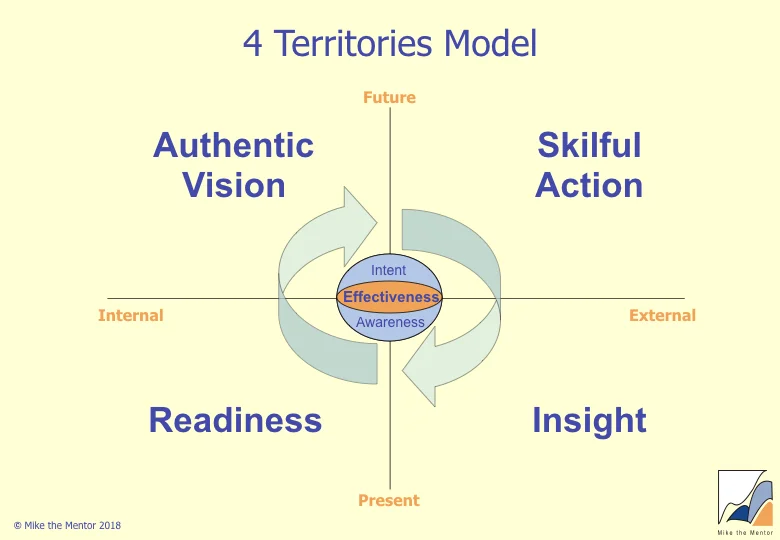Transformational Learning
/One way of understanding transformational learning is as a journey into the unknown. Each time we make this deeply personal journey we have to leave a place of stability and familiarity, travel into unfamiliar territory where we encounter various tests and challenges, discover a precious treasure, and bring this treasure back to our familiar world. The treasure is lost parts of who we are and, in restoring these lost parts to our selves, we become more whole and move to a more encompassing worldview.
transformational learning - the four phases
The journey consists of four phases:
Consolidation
Dissatisfaction
Letting Go, and
Synthesis.
Consolidation
When we first arrive at a particular stage in our lives and career, we lack many of the skills necessary to operate effectively at that stage. We therefore face a period of Consolidation during which we develop the skills and competencies necessary to meet the challenges of the particular life stage. As our capabilities increase, so we will tend to feel increasingly fulfilled and satisfied, and have a growing sense of contentment and stability. We are able to meet life challenges and our abilities are in a healthy dynamic equilibrium with our surrounding life conditions.
Whilst this dynamic equilibrium can in theory continue indefinitely, what often happens is that, as we become increasingly successful in our existing role, so our sense of satisfaction and fulfilment starts to decrease. What was once compelling and exciting becomes mundane and boring. We have a sense of outgrowing our existing life and find ourselves seeking a new challenge or looking for a more meaningful role. And so we find ourselves in the Dissatisfaction phase.
Dissatisfaction
Here our life is no longer working as well. Goals and aspirations that motivated us a few years earlier have been realised and no longer hold the appeal they used to. We feel trapped by our situation and feel that we have exhausted the possibilities in our current way of living. What was once meaningful is increasingly meaningless. This is an uncomfortable place to be and so our immediate response may be to ignore the invitation to change concealed within this breaking down and return to the Consolidation stage. We might do this by taking on new responsibilities or projects to try and rekindle the enthusiasm and sense of challenge we previously felt, or by seeking other ways of trying to deal with the problems we face. This has the attraction of taking us back to a simpler less complex place where we know how to operate and know who we are. But sooner or later the dissatisfaction is likely to return. This time we may move jobs or have an affair but still find only temporary relief from our doubt and confusion.
We can also find ourselves moved out of the Consolidation phase involuntarily – not because we have changed in some way but because our environment has. For example, a promotion, organisational change, or changing market conditions can all lead to our current ways of meeting life challenges no longer being adequate. And here too we may try to regain our former sense of competence and control by developing our existing skills further but find to our frustration that, however skillful we become, we are still not able to deal with the challenges we face.
And so we can find ourselves trapped in what appears to be an endless oscillation between Consolidation and Dissatisfaction. However, there is a way out of the trap and that is to Let Go.
Letting Go
When we finally accept that our old way of operating is no longer sustainable and that making incremental changes and trying to paper over the cracks is not sufficient, then we begin the process of letting go of the beliefs and attachments that no longer serve us. We realise that there is no turning back – but we also fear that there may be no way forward.
This is a time when we feel demoralised, frustrated, angry and despairing but it is also a time of opportunity and new possibilities. As the old ways of being and doing begin to fall apart, so the possibility of new ways of thinking, acting and leading emerge. Often, it is only when we finally, in despair, give up on the old ways, that the new can emerge. But this only happens when we let go of our expectations, preconceptions and ideologies, and our need to feel in control. In effect we have to let a part of our ego die so that we can become more of who we are.
Synthesis (Letting Come)
It is at this time, when all seems darkest and most difficult and when we are ready to give up, that something shifts and we find ourselves emerging from the emptiness of having let go into a new place of possibilities, resolution and excitement – Synthesis. We feel empowered, we have a new sense of who we are and what we can achieve. We see the world from a new, enlarged perspective.
We must now recross the threshold bringing the gift of our expanded sense of our selves back into our everyday lives and work. In one sense, we are back where we started consolidating and developing our skills. But the difference is that we have stepped up to a new level of consciousness and leadership, and the skills we are developing and using are more sophisticated, complex and global than those we were using before.
And there will come a time when these skills in their turn will eventually lack sufficient depth and meaning and once again we will hear the call to make the journey to our fuller selves and greater leadership potential.

